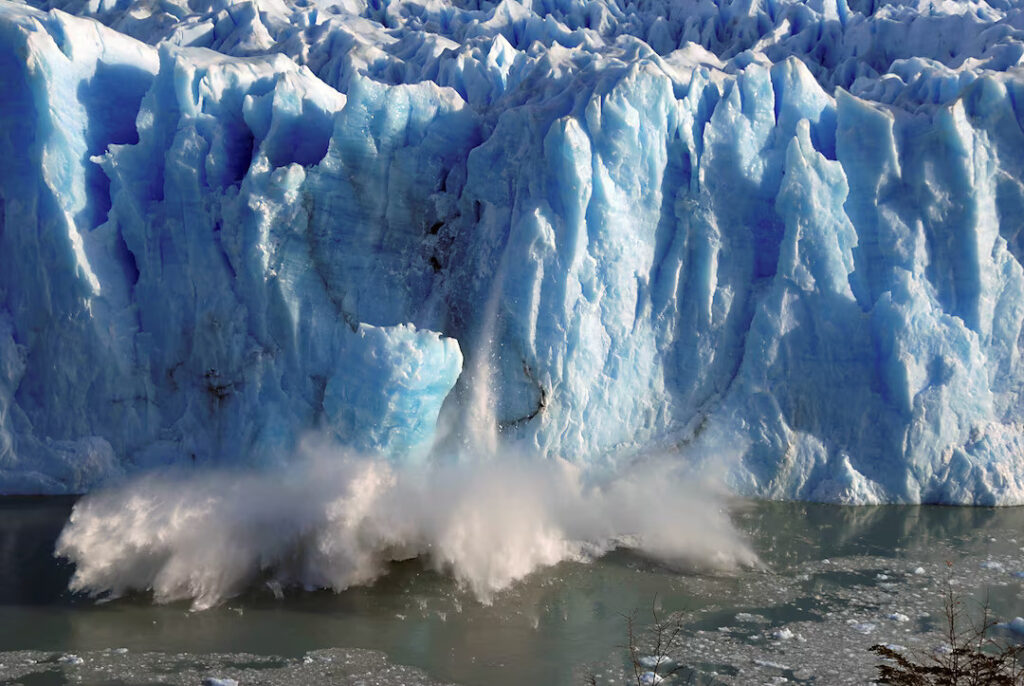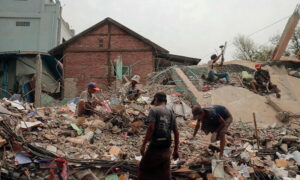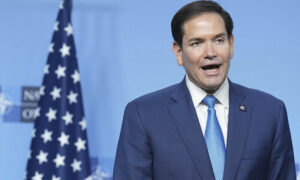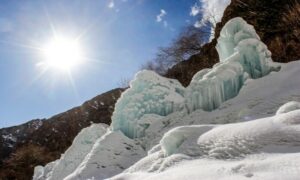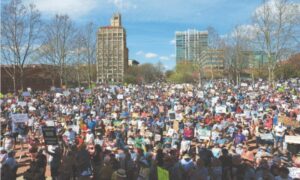PUBLISHED
January 12, 2025
KARACHI:
In his latest book The Earth Transformed, Peter Frankopan takes a sweeping look at the history of our planet, tracing the deep connection between humanity and the environment from the dawn of time to the present. Known for The Silk Roads, his groundbreaking rethinking of global history, Frankopan, Professor of Global History at the University of Oxford, shifts focus in his new work to the forces that have shaped human civilisation – climate and environment.
He argues that, while we often view ourselves as separate from the natural world, human history has always been intertwined with the Earth’s rhythms—whether in the rise and fall of empires or in the migration of peoples seeking more fertile ground.
Frankopan’s work is a much-needed reminder that humanity has often been the unwitting beneficiary of favourable environmental conditions but is also vulnerable to their sudden and catastrophic shifts. Whether it was the collapse of ancient civilisations like the Maya or the fall of Rome, environmental factors have often played an unseen role.
In The Earth Transformed, however, the British historian and author makes the case that the environment’s influence on history is no longer a passive one. For the first time, humanity itself—through industrialisation, colonialism, and relentless resource extraction—has become the primary driver of climate change, pushing the planet and society toward a perilous juncture.
Challenging traditional narratives centered on geopolitics and economic systems, Frankopan’s analysis highlights the central role of environmental forces in shaping human history. From the rise of early cities to the downfall of empires, climate has been a persistent yet often overlooked influence.
He warns that today’s human-driven changes are accelerating the planet’s transformation at unprecedented rates. “We are the product of massive climate change in the past,” he writes, but now we stand on the precipice of creating new environmental disasters of our own making.
In an interview with Channel 4 News’ Krishnan Guru-Murthy, Frankopan put it plainly: “When the music stops, what happens then?” His words reflect the growing sense of urgency around the environmental and geopolitical crises of our time.
The metaphor evokes a world where the systems we have relied on—global trade, international alliances, even the very stability of the planet—are at risk of collapsing. Despite the mounting evidence that our planet is rapidly changing, there remains a troubling reluctance to confront the scale of the problem.
With the accelerating impacts of climate change, from heatwaves to floods to biodiversity loss, the question is no longer whether the Earth is changing, but whether humanity can adapt in time. In a way, the transformation of the Earth that Frankopan chronicles is a race against time – a race to understand the full extent of the damage we’ve already caused, and a race to avoid the worst outcomes before they become irreversible.
His argument here, as in The Earth Transformed, is that we need a more holistic view of global issues—one that acknowledges the deep interconnections between climate, geopolitics, and human decision-making.
The days of seeing environmental crises as separate from the political and economic systems that govern our world are long over. As Frankopan looks to the future, he warns that history’s environmental disasters—droughts, famines, and resource shortages—may be small compared to what could lie ahead. In this context, his examination of history serves as both a warning and a guide.
Below is a full interview with British historian and author Peter Frankopan, where he expands on these pressing themes, touching on the geopolitical struggles of the Middle East, the growing tensions between China and the West, the historical context of climate change, and the urgent lessons we must learn from history if we are to avoid catastrophic consequences.
ET: How does the current conflict in Palestine fit within the broader historical patterns of geopolitical struggle in the Middle East?
PF: I could give a three-day answer about the broader historical patterns of geopolitical struggle in the Middle East; but what is going on today seems to owe much more to the personality of people like Benjamin Netanyahu, his cabinet, and the far-right in Israel, as well as to the senior leadership of Hamas in particular. All could have made different decisions before 7 October last year, and every day since then. A week before the attack, most of us thought we had finally reached a settlement that would lead to a long-term peace, prosperity, and resolution. So, while historical patterns matter, the decisions made since October 2023 are what have shaped what has happened. Responsibility for the atrocities and horrors that have followed lies with them.
ET: The US and Europe seem poised to isolate China or force it into negotiations on their terms over a wide range of issues. How do you view this standoff, and what does history suggest about the potential consequences of isolating a global power for geopolitical gains?
PF: I don’t think the US and Europe will try to isolate China; rather, they will try to put up barriers—or rather, to raise barriers even higher. But that can have consequences for China—where Trump is often referred to as ‘Comrade Trump’ on social media because his policies have strengthened Communist Party rule; it can have positive consequences for Pakistan and others, as if Chinese goods become more expensive in the US and Europe as a result of tariffs, Chinese companies will have to off-load goods more cheaply elsewhere. Hypotheses about global geopolitical power can make for great PowerPoint presentations, but it is easy to get carried away by imaginary games of international chess that do not reflect realities.
ET: Is the pursuit of geopolitical advantage preventing global cooperation on critical issues like climate change?
PF: Well, we know Trump does not believe in climate change—or at least says that he does not; and we know he is likely to open up more spaces to drill for and extract fossil fuels, which will make the world warmer. On the other hand, Biden issued more permits than Trump did the first time round, so this is not just a Trump issue. I am reasonably upbeat about the rate of adoption of renewable energy, the sharply lower costs of production of solar cells and other technologies, and also the innovation in the area of clean and green tech. But yes, as things stand, we are in a very tricky position in the short term. And we will face real challenges in the coming decade. Top of my list for Pakistan is calorie availability, water shortage, and rising food poverty. Those are issues we have not really had to think about for thirty years—or more.
ET: To what extent have historical climate events shaped global power structures, and how do these past events inform our current response to climate challenges?
PF: All history has been shaped by environmental factors. This was why our common ancestors chose to settle in the Indus Valley, in Mohenjo-Daro, in Harappa, and elsewhere—rather than the Gobi Desert; it is why societies have been successful, and also why they have come under pressure. We do not think about these, as all history we learn in the classroom and lecture theatre is human history, almost always about rich people, and usually only about men. We don’t ask what history looks like from the point of view of an elephant or a plant. But as I write in The Earth Transformed, the potato changed the world—helping drive the rise of cities, spurring scholarship, and even reducing the prospects of war. When we start to think more intelligently, we get answers that are both more interesting and more profound than endless lists of kings and queens.
ET: Since the publication of The Earth Transformed, how do you see the relationship between climate and humanity’s trajectory evolving?
PF: Well, it has not gotten better. In 2023, more oil was pumped than any year in history; this year will prove to be the warmest for around a million years; we had record levels of biodiversity loss. And so on and so on. So it’s hard to suggest that the relationship has improved. On the other hand, even the most sceptical onlooker can see storm damage, wildfires, and droughts becoming more regular, more damaging—and more expensive. So it is not surprising that many of my colleagues are extremely worried about what lies ahead.
ET: What are your thoughts on the roles of colonialism and industrialisation in contributing to the severity of the current climate crisis?
PF: Some of my colleagues believe these are all intimately linked. Indeed, some even see the subject of geology as a colonial and imperialist one. Clearly, the industrial revolution was central to the adoption of carbon-emitting fuels on a large scale, so for that reason, countries that industrialised quickly—like the UK or US—did the most damage. But colonialism in previous periods, and changes to landscapes, also often caused huge amounts of environmental damage. Deforestation, draining of wetlands, and exploitation of the natural world were hallmarks of the Arab empire, and that of the Mughals, just as they were under the Qing, the Inca, and others. It is true that sometimes emperors and leaders passed legislation to stop damage, although that was often related to controlling resources for themselves. What underpins the current climate crisis is the desire for cheap energy. We should not forget that the poorest in our societies are the beneficiaries; that is one reason why getting to agreement at climate summits is proving so difficult.
ET: What historical lessons can help modern societies address issues like global warming, the rise of right-wing movements, and the new wave of authoritarianism?
PF: We have lots of evidence and data that show extreme weather events lead to the centralisation of government and reductions in rights. So it’s not just right-wing movements that benefit. We know, too, that warming and other climate stresses raise prices, which drives inequalities—or at least can do so in the absence of central planning and intervention. So yes, higher levels of climate uncertainty due to warming, sea-level rises, one-off events, and so on, have political consequences. I explored many examples of this in my new book—looking at how Cleopatra’s fate, the French Revolution, cholera, pandemic disease, and even the rise of Hitler have ecological factors behind them. I think it’s really worth paying close attention to these lessons.
ET: If you were to prioritise global issues that must be addressed without compromise and urgently, what would they be?
PF: Emergency response. Just look at the floods in Pakistan in 2022: being able to anticipate that volume of rainfall, evacuate vulnerable people, secure and protect possessions, and be better prepared to deal with disaster relief provides one clear example of how vital it is to learn from the immediate past. That involves high-level planning, new training methods, the use of AI and other technologies, and top-level coordination. Many have not learned the lesson: just look at the disasters in the last few weeks in Spain, Colombia, and the Philippines. The Earth is transforming rapidly in front of our eyes. Those changes—and the implications that come with it—deserve a lot of attention. It is exciting to be fixated by Imran, Trump, Putin, or Boris Johnson. But a historian like me knows that personalities matter far less than fundamentals.
ET: What are your thoughts on America’s current position in the world and its historical role in maintaining global peace? Can it be trusted to end the ongoing conflict in the Middle East?
PF: It is true that the US seems like it is withdrawing from international politics. But that is not necessarily a bad outcome for Americans or for others. Likewise, China’s increasing involvement is neither good nor bad; some elements are positive, others are challenging. Just look at CPEC. So on this too, being pragmatic matters. As to whether the US can be trusted to bring peace, maybe a better question is: can Israel, or Hamas and Hezbollah, Iran or others? We are used to blaming the US for everything, and thinking it has a magic wand. But the response in some parts of Washington that other peoples’ problems are not American problems does not seem entirely wrong to me.

